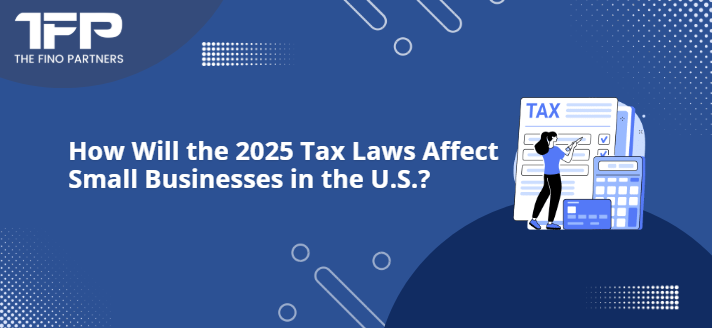Are you a small business proprietor and confused about how the new 2025 tax laws will impact your business? As inflation reshapes costs of business and regulatory agencies introduce new regulations, understanding the way the 2025 tax laws affect your small business is essential.
If you operate an LLC, a sole proprietorship or a partnership, this year's tax changes might impact everything from how much you owe to how you file your taxes. Tax preparation services can help you in such a situation to remain compliant and comply with your IRS obligations. In this blog, let us understand clearly what these big updates mean for you in 2025.
Impact of 2025 Tax Laws on Small Businesses in the USA
Here is the how the 2025 tax laws will affect small businesses in USA:
1. Inflation Adjustments to Tax Brackets
The IRS adjusts tax brackets every year according to inflation. In 2025, those adjustments might put some businesses in a brand-new tax bracket, which could raise or decrease what you owe.
What This Means to You:
- In case your revenue has remained the same, you might pay less due to adjusted thresholds
- If your profits spiked, you may pay more
Use small business tax consultation services to decide if you still have the best tax structure (LLC, S-Corp, etc.)
2. Higher Standard Deductions & Credits
In 2025, the standard deduction rose again, allowing many small businesses to lower taxable income.
- Singles and married individuals filing jointly will see modest increases in deductions
- Kid tax credits and earned income credits also have been adjusted to reflect the cost of living
In case you are a sole proprietorship, these deductions might lower your tax liability overall.
3. SALT Deduction Workarounds in High-Tax States
States like California, New York, and Illinois continue to implement inventive approaches to federal SALT deduction limits.
SALT—What Is It?
SALT stands for State and Local Taxes. There's a federal cap (USD 10,000) on how much individuals can deduct. This hurt some small businesses in high-tax states.
2025 Update:
- States offer pass-through entity (PTE) tax elections.
- This enables partnerships and LLCs to pay state tax at the entity level without hitting the individual SALT cap.
What You Should Do:
Consult a tax advisor for opting into these schemes. This is among the more complex areas where tax advisory services for small businesses can help you maximize your deductions.
4. New BOI Reporting Rules (Not a Tax but Financially Relevant)
While not directly associated with taxes, the 2025 Corporate Transparency Act adds another layer of compliance.
In case you have or control an LLC or company, you now owe FinCEN Beneficial Ownership Information (BOI).
What's Required?
- Names, addresses & ID numbers of persons in substantial ownership or control
- Existing businesses must file before Dec 31, 2025
- New businesses receive 30 days from formation
Failing to comply could lead to penalties and fines, raising your operating expenses indirectly. Being compliant keeps you audit-ready and financially healthy.
5. IRS Enforcement and Digital Reporting Expansion
With improved IRS funding and a focus on closing the tax gap, audit rates for small businesses are expected to rise beginning in 2025.
Key Changes:
- More AI & analytics to flag suspicious returns
- More stringent electronic reporting requirements for platforms like PayPal, Venmo, Etsy, and more
- 1099-K Reporting Threshold: Now USD 600/year (down from USD 20,000)
Who Is Affected?
- Freelancers
- Etsy/eBay sellers
- Gig workers
- Businesses accepting online payments
So, ensure you're tracking all digital income and reporting it accurately. If your records are not organized, tax preparation services can help you before filing.
6. Expanded Tax Credits for Green Investments
If your small business went green, like installing solar, switching to electric vehicles, or upgrading to energy-efficient appliances, you might be eligible for new or extended green tax credits in 2025.
Examples:
- Commercial Clean Vehicle Credit
- Energy-Efficient Commercial Building Deduction (179D)
How to Qualify:
You must meet IRS documentation requirements, including performance certifications.
Explore your eligibility with a CPA who knows small business tax laws.
7. Work Opportunity Tax Credit (WOTC) May Be Extended
The WOTC provides tax credits to companies that hire individuals from targeted groups (veterans, SNAP recipients, long-term unemployed, etc.).
Why This Matters:
You can claim up to USD 9,600 per hired employee through this program—potentially a big tax-saving tool.
Note: Companies must complete IRS Form 8850 within 28 days of the employee's start date.
8. Possible Changes to Retirement Contribution Limits
There are ongoing debates about raising contribution limits for SEP IRAs, SIMPLE IRAs, and Solo 401(k)s, which are popular with small businesses.
2025 Scenario:
- Increased limits = increased tax-deferred savings
- Small businesses can now deduct more by contributing to these plans
If you aren’t using retirement plans to save on taxes, 2025 might be the year to begin.
9. Sales Tax Nexus Laws Tightening Across States
States continue to redefine economic nexus laws, defining when a business must collect sales tax even without a physical presence.
If You Sell Online Across States, You Might Need To:
- Collect sales tax in more states
- Register for more permits
- File more tax returns
Noncompliance can lead to audits or penalties. Small business tax consulting helps you stay compliant across multiple jurisdictions.
10. More Scrutiny on R&D Tax Credits
Small businesses often overlook the Research & Development (R&D) Tax Credit.
Changes in 2025:
- The IRS will closely verify R&D credit claims
- Businesses must document qualified activities in detail
If you're in tech, manufacturing, or product development, this credit could save you thousands, but only if you have strong records.
Also Read | What are New Tax Laws and Regulatory Changes in the USA 2025?
How Should You Prepare?
|
Task |
Benefit |
Deadline |
|
Review entity structure |
May lower your tax burden |
ASAP |
|
Collect digital income records |
Prepare for new 1099-K rules |
Year-round |
|
Explore PTE elections in high-tax states |
Potentially reduce federal taxes |
Before filing |
|
File BOI report with FinCEN |
Avoid penalties |
Dec 31, 2025 |
|
Track green investments |
Unlock tax credits |
Before year-end |
|
Reassess payroll & hiring practices |
Use WOTC credits |
28 days from hire |
Final Thoughts
2025 promises lots of complicated but manageable tax changes, if you're prepared.
From BOI reporting and inflation-based bracket shifts to new SALT workarounds and IRS enforcement, there are many ways small business owners can either benefit—or face penalties.
This is exactly where partnering with tax preparation services becomes not just a tax season task but more of a year-round strategy.
By staying current and working with experts like us who understand new tax regulations for small businesses, you can cut costs, avoid risk, and grow with confidence.




























